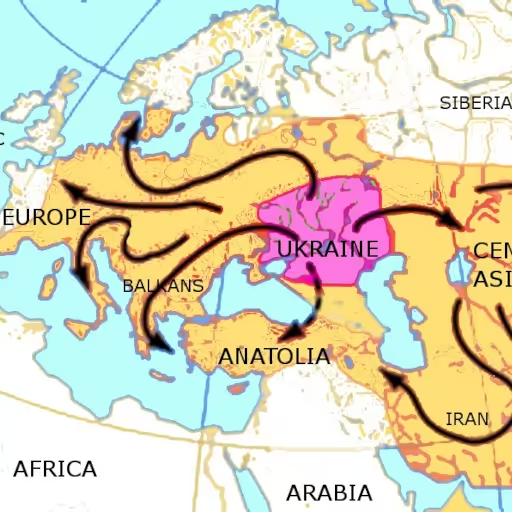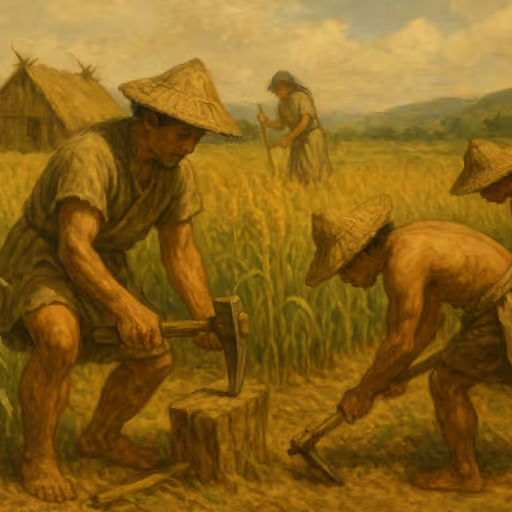Leute, люди (ljudi), and Liberty: An Indo-European Etymological Roadmap
The etymology of the German word “Leute” (people) is a bit perplexing. In Russian it’s “люди”, and the actual Germanic word for “people” is just “folk” (or ‘Volk’ auf Deutsch), so is Leute a loanword from Slavic languages, or did those variants come from some older, shared Proto-Indo-European (PIE) source?
👉 Read the German version of this article.
What is Etymology?
First off, what is etymology exactly?
Etymology is the study of where words come from and how their forms and meanings change over time. It traces a term back through earlier historical stages (Modern → Middle → Old), reconstructs older, unattested forms where needed (marked with an asterisk, e.g., *leudh-), and compares related words across languages to determine common ancestry. Good etymology looks for:
- Regular sound changes (e.g., how PIE *dʰ typically becomes Germanic *d).
- Morphology (how suffixes like -os, -ro build nouns/adjectives).
- Semantic drift (how “people of a tribe” can become “free men,” then abstract “liberty”).
- Borrowings vs. inheritance (Latin/French loans into English vs. native Germanic words).
In short: etymology is historical linguistics applied to individual words.
What is the Etymology of ‘etymology’?
The word etymology comes from the Greek word etymon, which means “true sense” or “true meaning.” This is derived from the Greek root etymos, meaning “true” or “real.” The suffix -logy comes from the Greek logia, which means “study” or “discourse.”
Thus, etymology literally translates to the study of the true meaning of words. It involves tracing the history and origin of words, including their changes in form and meaning over time. The term has been used in English since the late 14th century, reflecting the interest in understanding the roots and development of language.
Historical Linguistics and Indo-European
Historical linguistics studies how languages change over time and how they are related. For Indo-European work, it relies on the comparative method: establish regular sound correspondences, compare morphology (derivational endings like -os, -ro), and track semantic shifts to decide whether words are cognates (inherited from a common ancestor) or loans.
In our case, the PIE root *leudh- “people; free members of the tribe” is reconstructed from recurring patterns across branches. With standard correspondences (e.g., Grimm’s Law: PIE dʰ → Proto-Germanic d), we get PGmc *liudiz → OHG liut → NHG Leute. In Slavic, the same root yields Proto-Slavic *ľud- → Russian люди (ljudi). A -ro- derivative gives Lat. liber “free” → libertas “freedom” → English liberty. The forms line up phonologically, morphologically, and semantically, which is why these count as cognates, not borrowings.
A common pitfall is look-alikes from different roots: Old Norse lýðr “people” (↔ Leute) is distinct from Old Norse ljóð “poem, song” (↔ German Lied), the latter from a different PIE base (often analyzed under *leu- “to sound/sing”). Historical linguistics separates these by checking systematic sound laws, distribution across branches, earliest attestations, and native morphology.
What counts as evidence (quick checklist):
- Regular sound laws (Grimm’s Law, Verner’s Law), ablaut patterns, laryngeals, satem/centum splits
- Shared morphology (suffixes like -os, -ro, noun/adj. paradigms)
- Plausible semantic pathways (tribal “people” → “free” → “freedom”)
- Geographic breadth (Germanic + Slavic + Italic) that’s hard to explain by recent borrowing
Leute Etymology
Leute ‘people’ is the modern German plural that goes back to Old High German liut ‘person; people’ and Middle High German liute (plural). The lineage is inherited Germanic, not borrowed:
- Proto-Germanic: *liudiz (sg.) ~ *liudōz (pl.) ‘person; people’
- Proto-Indo-European (PIE): *leudh- ‘people; members of the tribe; (by extension) free men’
The same root shows up across Indo-European:
- Old English lēod ‘person, people, nation’ (poetic/archaic in later English)
- Old Church Slavonic люди (ljudi) ‘people’, kept in modern Russian люди
- Lithuanian liaudis ‘people, nation’
In German, the singular liut eventually fell out of everyday use, but the plural survived and fossilized as Leute, which today simply means “people/folks” (countable individuals viewed collectively). For the sense “a people, a nation,” German typically uses Volk—a different Germanic word with a separate origin. Source (paraphrased & expanded): Etymonline: leute
Leute: German to English
If you’re going German to English, Leute translates straightforwardly as “people” (informal nuance: “folks”). A few usage notes that matter for translators:
- Plural-only: die Leute has no natural singular *der Leut(e) meaning “a person.” For “a person,” German uses eine Person or ein Mensch.
- People vs. a people: Leute = people as individuals; (das) Volk = “a people/nation.”
- Register: Leute is everyday German; Personen is formal/counting contexts (e.g., “max. 4 Personen”).
Historically, English once had a native cognate to Leute: Old English lēod ‘person, people, nation’. But after the Norman Conquest, the Latin-French word people (from Old French pueple/peuple, ultimately Latin populus) rose to dominance and displaced most native terms in general usage. Two points complete the picture:
- folk (native Germanic, cognate with German Volk) remained, but mostly as a stylistic/semantic niche (“folk music,” “folklore,” “folks at home”).
- thede (early Middle English), from Old English **þeod ‘people, race, nation’ (PIE *teutā- ‘tribe’), largely died out. Traces linger in place-names like Thetford and in obsolete forms like thedish ‘native; of the people’.
So the modern mapping is:
- Leute → people (Eng.)
- Volk → people / nation (Eng.)
- The older lēod and þeod survive only as historical/onomastic fossils, while French-Latin people became the everyday English word.
Source (paraphrased & expanded): Etymonline: ‘people’
So What is the Etymological Connection Between ‘Liberty’, Ger. ‘Leute’, OE ‘Lēod’, and Slavic ‘люди’ (Ljudi)?
Great question — this one looks tricky at first glance because Leute and люди (“people” in Russian) look so similar, but the history clears it up.
1. German Leute
- Form: Leute is the modern plural of Middle High German liut (singular, “person”), from Old High German liut (“man, person, people”).
- Proto-Germanic: from liudiz (plural liudōz), meaning “person, people, folk.”
- Cognates: Old English lēod (“person, nation”), Old Norse lýðr (related to “people”), Gothic liuda (“people”).
- Over time, the singular use (liut) died out in German, but the plural form (Leute) survived, now meaning “people” in general. Meanwhile, Volk stayed as the collective term.
So Leute is not a loanword — it’s inherited Germanic vocabulary.
2. Slavic люди (Russian)
- Russian: люди (“people”).
- Old Church Slavonic (OCS): люди (ljudi), same form and meaning.
- Proto-Slavic: ľudьje (“people”), from the same root.
- Cognates: Polish ludzie, Czech lidé, Serbo-Croatian ljudi.
3. Shared Indo-European Root
Both the Germanic and Slavic words come from the same Proto-Indo-European (PIE) root:
-
PIE leudh- (“people, men, free men, nation”), also meaning “to grow” in some extended senses.
-
This is the source of:
- Germanic liudiz → German Leute
- Slavic ľudьje → Russian люди
- Celtic: Old Irish lúath (“people, host”)
- Possibly Latin liberi (“children, the free”) is related too.
4. Contrast with Volk
- Volk comes from Proto-Germanic fulką, PIE peupleh₂- (“crowd, people”), unrelated to Leute.
- That’s why German has two common “people” words (Volk = “a people, a nation”; Leute = “individuals, folks”).
✅ So:
- Leute is not borrowed from Slavic — it and люди are true cognates, both from PIE leudh-.
- Old Church Slavonic already had люди, exactly like modern Russian.
- German just happened to lose the singular liut but keep the pluralized Leute, while Slavic preserved both form and meaning.
PIE paradigm → Germanic liut vs. Slavic ľudьje
Let’s go into the exact PIE declension paradigm that gave rise to liut vs. ľudьje, so we can see how the forms diverged in Germanic vs. Slavic.
The PIE root is conventionally reconstructed as leudʰ- “people, men, free men, to grow.” It gave rise to a thematic noun:
- PIE: leudʰ-ós (sg. nom.) → “a person, member of the people.” Plural leudʰ-óes (nom. pl.).
Proto-Germanic ‘leud’
- PIE leudʰ-ós → Proto-Germanic *liudiz (sg.), plural *liudōz.
- Old High German: liut (sg./pl.).
- Middle High German: liut (sg.), liute (pl.).
- Modern German: singular died out, plural fossilized as Leute.
Proto-Slavic *ľudь
- PIE leudʰ-ós → Proto-Slavic *ľudь (sg.), plural *ľudьje (collective plural form).
- Old Church Slavonic: люди (ljudi).
- Russian: люди (same form).
So both branches reflect the same PIE paradigm: a simple thematic noun meaning “a member of the people,” with the plural generalized.
Is liberty related?
Yes — though it’s a distant cousin.
- Latin liber “free (man)” ← PIE *leudh-ro- (“belonging to the people,” i.e. not a slave, one of the free men).
- From liber → Latin libertas “freedom” → English liberty.
- Same base root leudh- “people, free men.”
So:
- German Leute, Slavic люди = “the people.”
- Latin liber, libertas = “the free members of the people” → freedom.
They share the same PIE ancestor, but different derivations:
- -os noun (leudʰ-ós) → “person, people” → Leute/люди.
- -ro- adjectival formation (leudʰ-ro-) → “free, belonging to the people” → liber/liberty.
✅ Bottom line:
- Leute, люди, and liberty are indeed cognates, all tracing back to PIE leudh- “people/free men.”
- The “free” sense in liberty isn’t accidental: in early Indo-European societies, “the people” were implicitly the free members of the tribe, as opposed to slaves/outsiders.
Modern Cognates of Leute/люди from PIE
Let’s create a “map” of the exact cognates in Old English, Gothic, Old Irish, etc. so we can see the whole Indo-European footprint of leudh- at a glance,
PIE leudh- “people, free men” — cognate map
Here’s a clean and comparative table bridging the gap between these words in various IE languages:
| Language Family | Word (Form) | Meaning | Notes |
|---|---|---|---|
| Proto-Indo-European | leudh-ós / leudh-ro- | people / free (adj.) | Base noun vs. adjectival -ro- derivative (“belonging to the people”). |
| Proto-Germanic | liudiz (sg.), liudōz (pl.) | person; people | Regular outcome of PIE leudh-. |
| Old High German | liut | man; people | Plural survives → Leute. |
| Middle High German | liute (pl.) | people | Path to modern Leute. |
| Modern German | Leute | people (plural only) | Everyday “folks.” |
| Old English | lēod | person; people; nation | Native cognate; later displaced by French-Latin people. |
| Old Irish (Celtic) | lúath | people; host; warriors | Cognate from PIE leudh-, also meaning “swift”; semantic shift attested. |
| Modern English | lede (n.2) (obsolete) | people; nation; subjects | From OE lēod; fossilized sense noted in “all lede” (“all the world”). |
| Old Norse | lýðr | people | Correct Norse reflex (not ljóðr, which is “poem”). |
| Slavic (Proto-Slavic) | ľudь (sg.), ľudьje (pl.) | person; people | Direct from PIE noun formation. |
| Old Church Slavonic | люди (ljudi) | people | Continues in East Slavic. |
| Russian | люди (ljudi) | people | Direct continuation of OCS. |
| Polish | ludzie | people | Proto-Slavic base. |
| Czech | lidé | people | Vowel shift; same root. |
| Serbo-Croatian | ljudi | people | Direct cognate. |
| Latin | liber (adj.), libertas | free; liberty | From PIE leudh-ro- → “of the people” ⇒ “free” ⇒ “freedom.” |
NOTE: Gothic þiuda (“people, nation”), Old English þeod (“nation, race”), and German Deutsch (from theodisc, “of the people”) are another set of IE words for “people”, and they go back to a different Proto-Indo-European root: teutā- (“tribe, people”).
This is the same element behind words like Teutonic and even Celtic tribal names such as Teutones. So while Leute / lēod / ľudьje are all cognates from leudh-, Germanic also had an alternate root for ‘people’ that lives on in words like Deutsch and place-names ending in -thede/-thod.
Conclusion
German Leute and Slavic люди (ljudi) aren’t borrowings; they’re cognates from the Proto-Indo-European root leudh- “people; free men.” German later lost the singular liut but kept the pluralized Leute for “people,” while Volk/folk carried the “a people, a nation” sense via a different Germanic word. In English, native lēod (“people, nation”) was largely displaced after the Norman Conquest by French-Latin people, though relics survive (see lede (n.2) below). Latin liber/libertas (“free, freedom”) is a derivative of the same PIE base via -ro-, reflecting the old social contrast between free members of the tribe and non-free outsiders. Net: Leute, люди, and liberty sit on the same deep branch; usage and semantics diverged later.
Sources
- Etymonline — leute (paraphrased): https://www.etymonline.com/search?q=leute
- Etymonline — people (paraphrased, displacement of native terms): https://www.etymonline.com/search?q=people
- Etymonline — leod / lede (n.2) (paraphrased): https://www.etymonline.com/search?q=leod
- Wiktionary — люди (Russian): https://en.wiktionary.org/wiki/%D0%BB%D1%8E%D0%B4%D0%B8
- Wikipedia — Proto-Indo-European language (background): https://en.wikipedia.org/wiki/Proto-Indo-European_language
- Wikipedia — Indo-European languages (background): https://en.wikipedia.org/wiki/Indo-European_languages










